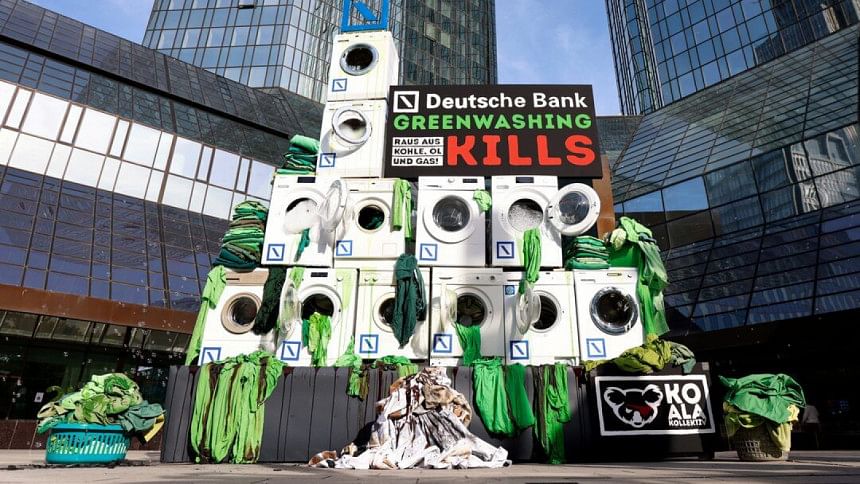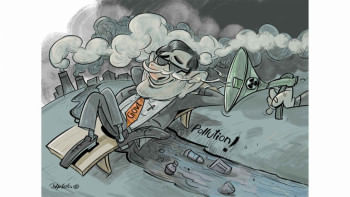Corporate climate action must not be ignored

Today, environmental responsibility is no longer just a moral obligation but a business imperative, driven by the dual forces of public expectation and financial prudence. A survey by Cone Communications revealed that 87 percent of consumers would buy from a brand that advocates for issues they care about, while 61 percent of millennials consider a company's environmental and social goals when seeking employment. The message is clear: companies that fail to prioritise sustainability risk losing their market share and talent pool.
However, despite this growing corporate interest in climate action, the intersection of such efforts with global inequities remains critically overlooked. While multinational corporations proudly announce their climate goals, the real impact of their actions is often felt most acutely in vulnerable nations like Bangladesh—countries on the frontline of climate change.
The world's largest corporations are responsible for a disproportionate share of global carbon emissions. According to the Carbon Disclosure Project (CDP), the top 100 companies account for a staggering 71 percent of global greenhouse gas emissions. In theory, this concentration of responsibility means that corporate action could have an outsized impact in mitigating the climate crisis. However, the complexities of global supply chains, resource extraction, and waste management present serious challenges, especially when corporate climate strategies are applied to developing nations.
Companies like Unilever, Coca-Cola, and Logitech are positioning themselves as leaders in corporate sustainability. Their ambitious climate commitments—such as achieving net-zero emissions—are commendable on paper. But a deeper look reveals an uncomfortable reality about the fairness and feasibility of their efforts in regions of the Global South like Bangladesh, where local realities often clash with corporate ambitions.
While these corporate giants have the power to either mitigate or exacerbate the crisis, the ethical complexities and global inequalities surrounding their climate strategies demand a more critical examination, especially when applied to nations on the climate frontline. The path they choose will profoundly shape the planet's future, but the complexity of corporate climate action raises unsettling questions: Are we witnessing genuine sustainability efforts, or is this another chapter of corporate greenwashing?
Take Unilever, for example. The company has made bold commitments to achieving net-zero emissions across its value chain by 2039 and reducing absolute green house gas (GHG) emissions by 2030. Through initiatives like the Climate Transition Action Plan (CTAP) and a one billion euro investment in Climate & Nature Fund, Unilever has championed deforestation-free supply chains and sustainable farming practices. However, while the headlines are grand, the reality is far more nuanced.
Unilever's strategy depends heavily on its vast and fragmented supply chain, spanning 190 countries and countless suppliers, many of whom operate in regions with weak regulatory frameworks, which can provide little protection against environmental exploitation. The burden of meeting Unilever's climate goals often falls disproportionately on suppliers in developing nations, including Bangladesh, where environmental protections are lax, and local communities have limited capacity to shoulder additional costs.
Accusations of greenwashing continue to plague many corporate sustainability efforts, including those of Unilever. In 2021, the UK's Competition and Markets Authority (CMA) launched an investigation into the environmental claims of several multinational corporations, including Unilever, questioning whether their marketing practices were misleading consumers about the true environmental impact of their products. These concerns highlight a broader doubt about corporate transparency in sustainability efforts.
The challenge of greenwashing is even more apparent in Coca-Cola's case. The company has pledged to achieve net-zero emissions by 2050 and aims to achieve a 25 percent reduction in absolute GHG emissions by 2030, paired with initiatives to use 100 percent renewable electricity and promote recycled polyethylene terephthalate (PET) in packaging. This positions the beverage giant as a major player in corporate climate action.
But Coca-Cola has long been the poster child of the plastic waste crisis, particularly in developing countries like Bangladesh, where single-use plastic contributes to mounting environmental degradation. The contradiction is glaring: how can a company build on a high-consumption, high-waste model aligning with sustainability principles? Coca-Cola's efforts to recycle and reduce waste in developing countries are often overshadowed by the sheer scale of plastic pollution that it generates. In Bangladesh, where waste management infrastructure is already overburdened, the influx of plastic waste from market leaders only exacerbates local environmental challenges.
The focus on circular economy initiatives, while important, often remains a public relations effort rather than a transformative change in business practices that could reduce the burden. Despite its sustainability rhetoric, a lawsuit filed in Washington DC in 2021 further accused Coca-Cola of making misleading claims about the recyclability of its plastic bottles, alleging that the company's sustainability promises were deceptive. The plastic paradox—the tension between high-consumption models and sustainability goals—remains unresolved.
Logitech's push to become "climate positive" by 2030, having already achieved 94 percent of its renewable energy goals, meaning it plans to remove more carbon from the atmosphere than it emits, presents the tech company as a sustainability pioneer. It was the first consumer electronics company to place carbon impact labels on its products, a commendable step towards transparency. Yet, as with Unilever and Coca-Cola, the ethical implications of Logitech's climate strategy require closer scrutiny.
The tech industry's reliance on rare earth minerals and metals extracted from regions with lax environmental and labour regulations casts a shadow over its green credentials. Logitech's reliance on carbon offsets raises concerns. While offsets can play a role in compensating for residual emissions, they often distract from the harder work of reducing emissions at the source.
In countries like Bangladesh, which is becoming a dumping ground for e-waste, the tech industry's environmental impact goes far beyond operational carbon footprints. The lack of robust e-waste management systems means that discarded electronic devices pose a growing risk to public health and the environment. Logitech, like other tech giants, must address these broader impacts if its sustainability efforts are to be truly meaningful.
Bangladesh is one of the world's most climate-vulnerable nations, contributing less than 0.5 percent of global emissions while disproportionately suffering from the impacts of climate change. Against this backdrop, the involvement of multinational corporations in Bangladesh presents both opportunities and risks.
Multinational corporations could play a vital role in supporting Bangladesh's climate resilience. Unilever, for instance, could invest in climate-smart agricultural practices, supporting local farmers with sustainable irrigation systems and renewable energy infrastructure. Coca-Cola, given Bangladesh's growing waste management challenges, could promote circular economy models by establishing recycling facilities and eliminating plastic waste. Logitech, with its expertise in tech innovation, could help develop e-waste management systems, an area where Bangladesh urgently needs support. However, these initiatives must be grounded in local realities, ensuring that they benefit Bangladesh's most vulnerable communities.
The danger lies in the tendency for corporate climate action to prioritise global market demands over local environmental and social needs. For instance, the pressure to meet global net-zero targets often results in resource extraction, waste disposal, and economic burdens being shifted to countries like Bangladesh. The benefits of these initiatives often accrue in the Global North, while the Global South pays the price.
One of the most problematic aspects of corporate climate action is the tendency to outsource responsibility to developing nations. While companies in the Global North race to achieve net-zero emissions and adopt greener practices, the costs—both environmental and economic—are frequently passed down to suppliers and consumers in the Global South. These dynamic risks create a new form of colonialism, where wealthy nations and corporations shift the burden of climate mitigation onto poorer countries, all while reaping the benefits of a "green" image.
This imbalance reinforces global inequalities: while consumers in wealthier nations can feel good about buying "sustainable" products, the environmental and social costs of producing these goods remain hidden, borne by those least able to bear them. In this sense, corporate climate action risks perpetuating the very injustices it seeks to address.
For Bangladesh, this reality is already playing out. Achieving its ambitious climate goals under the Paris Agreement will require significant financial and technical support—support that is unlikely to come from domestic sources alone. If multinational corporations genuinely want to contribute to Bangladesh's climate resilience, they must move beyond surface-level commitments and engage in meaningful, long-term partnerships that prioritise local needs and knowledge.
The climate crisis demands urgent, transformative action. While multinational corporations have a significant role to play, their sustainability efforts must be more than public relations exercises. To truly address the climate crisis, companies must embrace an integrated approach—one that acknowledges the inequalities embedded in global supply chains and prioritises ethical, long-term solutions.
Corporate climate action cannot be merely about offsetting emissions or recycling a few bottles. It must confront the systemic injustices that allow wealthy nations and corporations to benefit from the Global South's resources while leaving local communities to endure most of the climate impacts. Corporate climate action cannot simply be a public relations exercise—these multinational companies must be held accountable for the full spectrum of their environmental and social impacts.
Md Zahurul Al Mamun is a climate change researcher and analyst.
Views expressed in this article are the author's own.
Follow The Daily Star Opinion on Facebook for the latest opinions, commentaries and analyses by experts and professionals. To contribute your article or letter to The Daily Star Opinion, see our guidelines for submission.

 For all latest news, follow The Daily Star's Google News channel.
For all latest news, follow The Daily Star's Google News channel. 










Comments